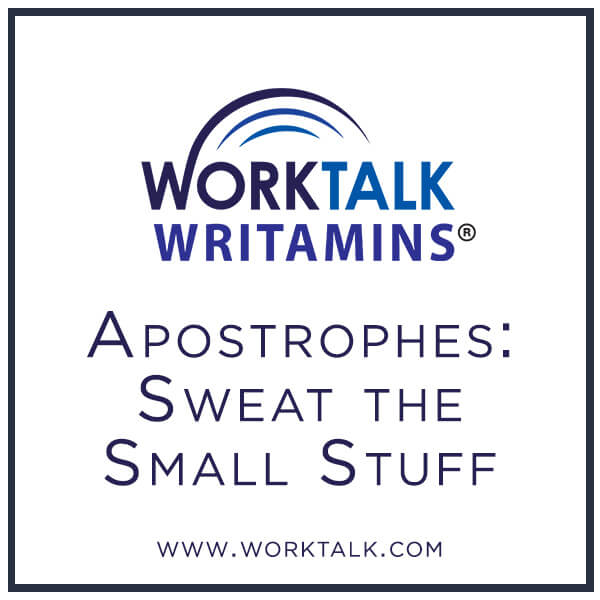
“I have put my Plan’s and Dreams into this project and I hope you will like it as much as I do.”
I received this message from a client who wanted me to recommend a product she’s developing. I didn’t get as far as deciding whether to recommend her product; I was flummoxed by the use of Plan’s next to the also-capitalized but correctly spelled Dreams. Plan’s? There is never a case when the plural of plan takes an apostrophe.
What words flew through my mind as I read this message?
Careless.
Rushed.
Uneducated.
This is not the first time I have received a message from this person that incorrectly forms a plural with an apostrophe. I’ve asked her about it, and she says, “Yeah, I was never good at English class, but you knew what I meant.” I did know what she meant. It meant she didn’t bother to check her work, even when she was asking for other people’s approval.
The person who wrote this had a good product. But the next time she writes to ask a favor, will I respect her to the same degree as before I read this message? There won’t be a huge drop in my respect, but there will be a chink in the wall of my good opinion.
You can call me a curmudgeon, but there are a lot of people like me, who care about using the language correctly and who make judgments based on how people write. Maybe the person you write plan’s to is one of the devil-may-care “I know what you meant” cadre — but maybe they’re among the curmudgeons. You may not know until you’ve dropped a notch in their estimation.
Apostrophe Mistakes to Avoid
Number one rule: Apostrophes do not form plurals! One car, two cars, not two car’s.
Here are a few other apostrophe-related errors that trip up many people.
it’s/its
Its is a possessive pronoun only. It means “belonging to it”.
It’s is a contraction of the words “it is”.
If you are not sure which word to use, here is a simple test:
Replace its or it’s with the words “it is”. If the sentence makes sense, use it’s. Otherwise, use its.
The Post Office is going to raise its rates. It’s going to be more expensive to mail a letter.
their/they’re/there
When people write in a rush, they often stumble over words that sound alike but have different meanings. Proofread everything and you will not confuse these words.
their means “belonging to them”.
they’re is a contraction meaning “they are”.
there means “in or at that place”.
They’re going to leave their briefcases there.
Your (pronoun) means belonging to you.
You’re (contraction) is a contraction of you and are.
Note that the response to “thank you” is ‘you’re welcome”.
So you’re the one who forgot your laptop.
Errors Undermine Credibility
When I natter on about punctuation, some people sigh and say, “Oh, yeah, those are details.” Yes, they are details. But they are details that create a sense of your professionalism in the minds of your readers. Granted, some people are willing to overlook plan’s and Dreams and go with the basic meaning. But millions of others are distracted and disturbed by that mistake and similar ones. Can you afford to undermine yourself with anyone who cares about correctness?
As we embark on a new decade, let’s commit to sweating the small stuff as well as the big stuff so that we retain our credibility. After all, our plans and dreams rely on it.
BONUS: Avoid common errors! Receive Worktalk’s list of frequently misused words. Send an email to lizd@worktalk.com and write “Bonus” in the subject line. I will send it to you.

©2020 Elizabeth Danziger All rights reserved
Take me to your leader! Communication woes drain the lifeblood from an organization. Connect me with your decision-makers and see how Worktalk can transform communication in your world. Contact me at lizd@worktalk.com or 310.396.8303. You can also book through www.calendly.com/worktalk.
~~~~~~~~~~~~~~~~~~~~~~~~~~~~~~~~~~~~~~~~~~~~~~~~~~~~~~~~~~~~~
About Worktalk
Here are some of the results you can expect from Worktalk’s written communication training. We prepare teams to write with clarity and confidence amid the pressing need for effective communication. Our process equips them with the mindset and tactics to strengthen credibility, increase influence, and generate new possibilities.
To learn more about how Liz might make a difference in your organization, call her at 310.396.8303 or email lizd@worktalk.com.
